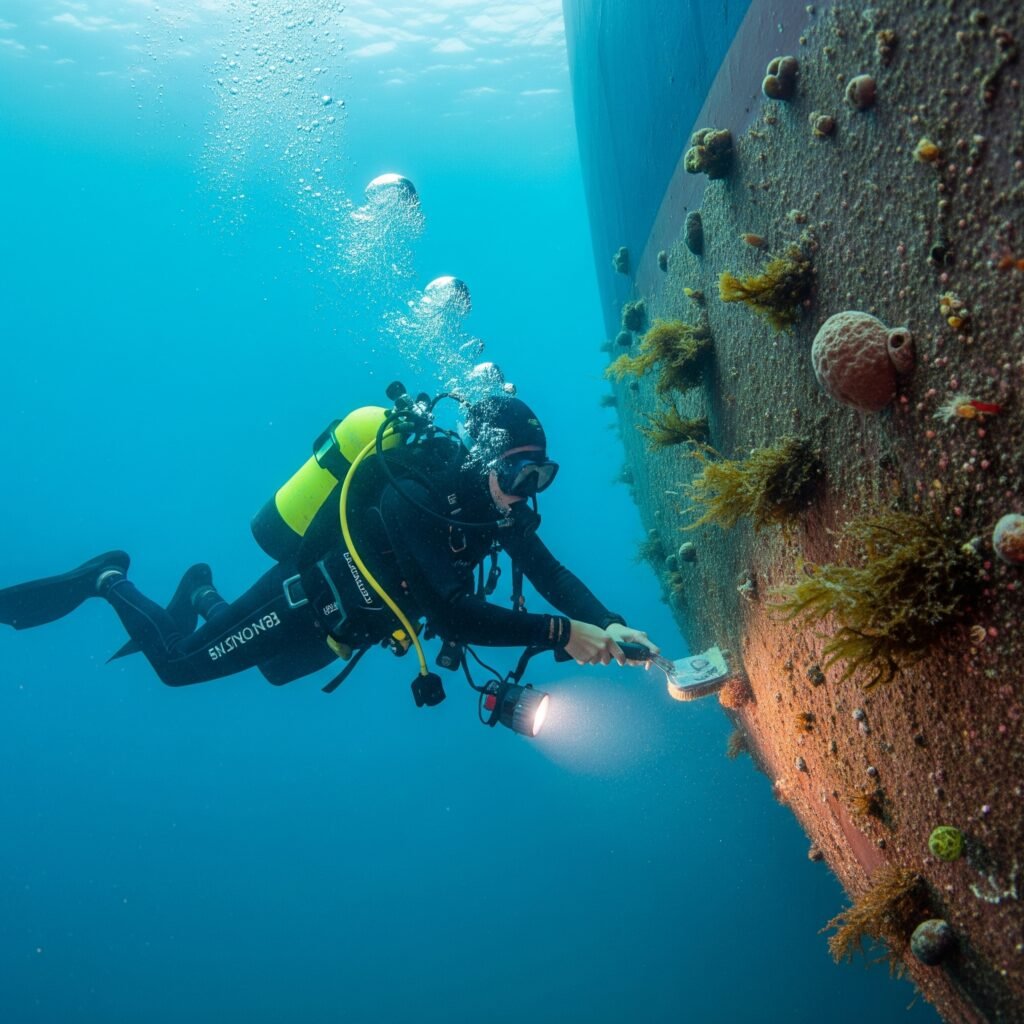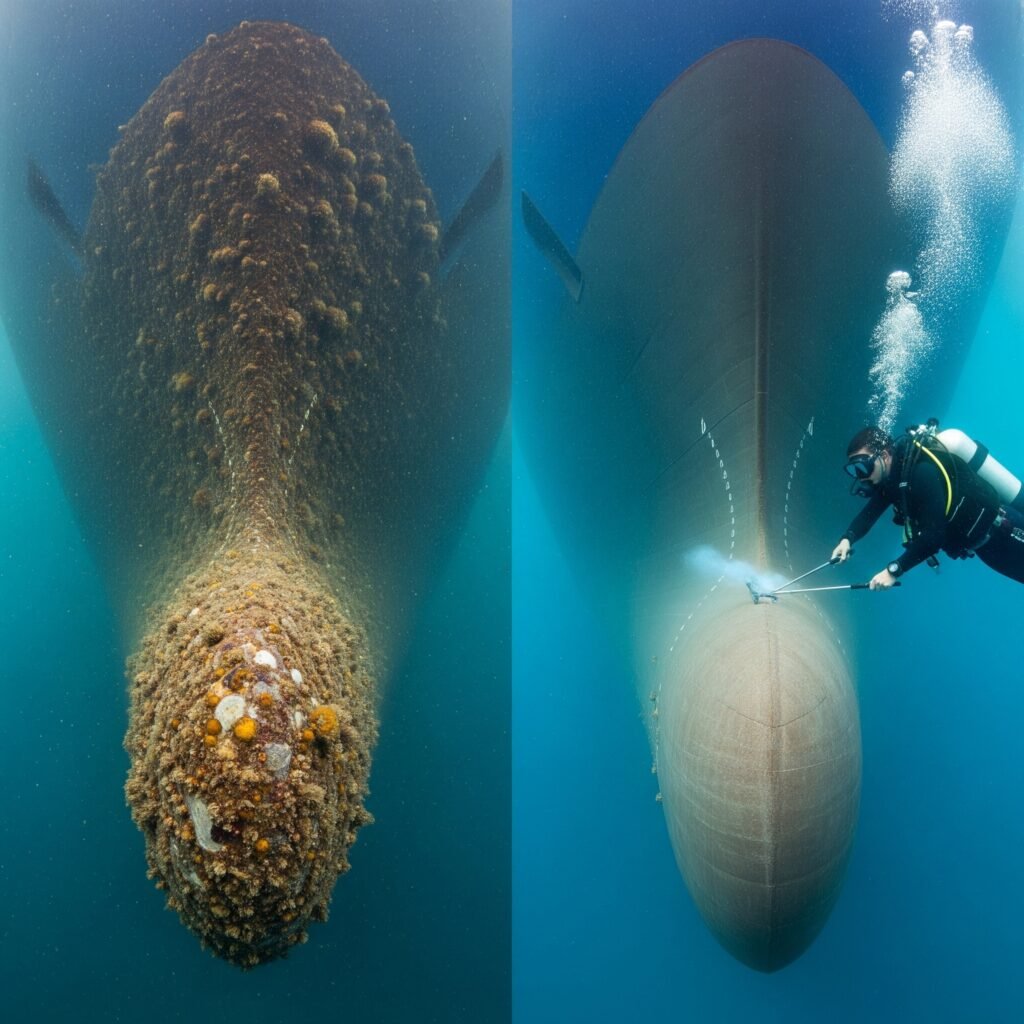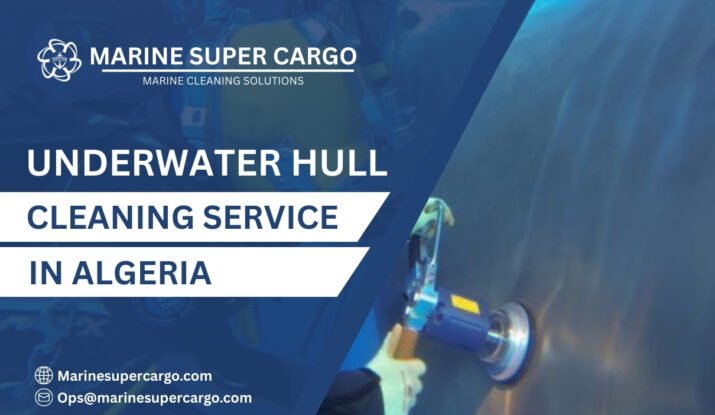Underwater ship hull cleaning in Algeria is a specialized procedure aimed at removing marine growth such as algae, barnacles, slime, and mussels from a vessel’s submerged surfaces. Carried out while the ship remains afloat, it eliminates the costly and time-consuming need for dry docking. The task is usually handled by skilled commercial divers or advanced remotely operated vehicles (ROVs), which are fitted with rotating brushes, scrapers, or high-pressure water jets to restore the hull’s smoothness and enhance vessel performance.
Importance of Underwater Ship Hull Cleaning in Algeria for Vessels
Marine growth on a hull can significantly affect a vessel’s hydrodynamics—increased friction results in higher fuel consumption, slower speeds, and elevated greenhouse gas emissions.
Over time, this not only leads to increased operational costs but also accelerates wear and tear on the ship’s propulsion system. Moreover, hull fouling facilitates the spread of invasive species, presenting environmental threats when vessels travel between different ecosystems.
Maintaining a clean hull offers numerous benefits:
- Up to 30% reduction in fuel consumption
- Improved speed and maneuverability
- Extended life of hull coatings and paint systems
- Lower maintenance and repair costs
- Reduced risk of transferring invasive species

Underwater Ship Hull Cleaning in Algeria
Algeria, with its strategic location on the Mediterranean Sea, hosts several significant commercial ports such as Algiers, Oran, Annaba, and Skikda. These ports cater to a wide array of maritime activities, from oil and gas transportation to commercial shipping and fishing.
Algeria offers both local marine service companies and international contractors. Practices range from traditional diver-based cleaning to modern, eco-friendly ROV techniques. The country is gradually adopting stricter environmental policies, influencing the adoption of sustainable cleaning technologies and procedures.
Several international companies offer professional underwater hull cleaning solutions aligned with global environmental and safety standards, such as CleanShip, known for its innovative hull and propeller cleaning systems.
Impact of Underwater Ship Hull Cleaning in Algeria on Marine Ecosystems
Improper hull cleaning can introduce serious environmental risks. Scraping off fouling organisms can release toxins from antifouling coatings and spread non-native species. Additionally, debris and microplastics can pollute the water column, harming marine life.
Some key environmental risks include:
- Disruption of marine habitats
- Contamination from copper- or biocide-based paints
- Spread of invasive species between different marine environments
Regulations Governing Underwater Ship Hull Cleaning in Algeria
Algeria aligns with the International Maritime Organization’s (IMO) Biofouling Guidelines, which advocate responsible hull cleaning and antifouling practices. Local port authorities are responsible for enforcing these regulations, often requiring:
For a global perspective on shipping compliance, the Marine Super Cargo offers insights into maritime regulations, best practices, and industry updates.
- Prior authorization for underwater cleaning
- Environmental risk assessments
- Waste collection and disposal documentation
In many Algerian ports, hull cleaning is only permitted under certain conditions to minimize contamination. Some operators must report their cleaning operations and prove the use of containment or filtration systems.
Sustainable Practices for Eco-Friendly Underwater Ship Hull Cleaning in Algeria
To promote environmental sustainability, the following best practices are increasingly adopted:
- Use of biodegradable and non-toxic cleaning agents: Reduces the chemical footprint.
- Filtration and containment systems: Capture dislodged debris to prevent contamination.
- Scheduled maintenance: Frequent cleaning reduces the need for aggressive methods.
- ROV and robotic cleaning systems: Offer precision, minimal diver involvement, and reduced pollution.
Eco-conscious shipping companies also opt for silicon-based or foul-release coatings, which make marine growth easier to remove and reduce reliance on harsh chemicals.
Methods of Underwater Ship Hull Cleaning in Algeria
Traditional Cleaning Methods
Traditional methods rely heavily on human divers who use tools such as:
- Scrapers
- Wire brushes
- High-pressure water jets
These methods are cost-effective and widely available, but present limitations:
- Potential damage to antifouling coatings
- Higher safety risks for divers
- Lower cleaning consistency, especially on larger vessels
Advanced Technologies in Underwater Ship Hull Cleaning in Algeria
Modern hull cleaning methods prioritize efficiency, safety, and environmental compliance:
- ROVs (Remotely Operated Vehicles): Equipped with cameras, suction heads, and rotating brushes.
- Magnetic robotic cleaners: Adhere to the hull and clean with minimal human input.
- Cavitating water jets: Use controlled bubble implosions for gentle but effective cleaning.
These technologies reduce the risk of damage to hull coatings and can be operated remotely, enhancing safety and precision.
CleanShip’s robotic hull cleaning solutions exemplify how automation revolutionizes underwater maintenance.
Choosing the Right Underwater Ship Hull Cleaning in Algeria
Factors to Consider When Selecting a Service: When evaluating a hull cleaning provider in Algeria, consider:
- Certifications (e.g., ISO, IMO compliance)
- Technological capability (ROVs vs manual divers)
- Environmental safeguards
- Experience with your vessel type
- Documentation and reporting transparency
Evaluating Service Quality and Customer Reviews
Reputation matters. Check:
- Online reviews and testimonials
- Port authority feedback
- Industry forums and peer recommendations
- Case studies or documented service histories
Maintenance and Best Practices
Regular Maintenance Schedules for Underwater Ship Hull Cleaning in Algeria
The frequency of cleaning depends on multiple factors, including water temperature, salinity, and vessel activity. General guidelines:
- Commercial vessels: Every 3–6 months
- Fishing vessels: Every 2–4 months
- Naval and luxury ships: As per custom schedules or coating warranties
Tips for Vessel Owners to Maintain Hull Integrity
- Apply and regularly renew antifouling paint
- Conduct routine underwater inspections
- Maintain a hull maintenance logbook
- Replace sacrificial anodes when needed
- Avoid anchoring in areas prone to high fouling
Common Mistakes to Avoid in Hull Maintenance
- Delaying cleaning: Leads to extensive fouling and increased costs
- Using improper tools can damage coatings
- Overlooking niche areas: Propellers, sea chests, and rudders often get missed
- Ignoring corrosion signs: Early detection saves money

The Importance of Regular Underwater Ship Hull Cleaning in Algeria for Vessel Longevity
Routine hull cleaning enhances a vessel’s lifespan by reducing mechanical strain, fuel consumption, and corrosion risks. It also aligns ship operations with international environmental standards, helping vessel owners meet regulatory and sustainability goals.
Conclusion
Underwater ship hull cleaning in Algeria goes beyond routine maintenance—it’s a cornerstone of maritime sustainability and operational performance. With Algeria’s maritime economy steadily growing, consistent and environmentally responsible hull cleaning plays a crucial role in protecting marine ecosystems while ensuring vessels operate at peak efficiency.
FAQ:
Q1. What is the frequency of underwater hull cleaning recommended?
It depends on the vessel type and operating environment, but generally every 3–6 months.
Q2. Are there specific regulations for underwater ship hull cleaning in Algerian waters?
Yes. Algeria follows IMO guidelines and port authority rules that control environmental impacts and mandate proper waste handling.
Q3. How can I ensure that my hull cleaning service is environmentally friendly?
Opt for providers using eco-friendly tools (ROVs), biodegradable products, and documented waste collection procedures. Always check for environmental certifications.
Q4. Does underwater hull cleaning affect a ship’s warranty?
In some cases, yes. Many coating manufacturers require hull cleaning to be done using approved methods to maintain the warranty. Always verify with your coating provider.
Q5. Can hull cleaning be performed while the ship is loading or unloading cargo?
It depends on port regulations. Some ports allow simultaneous operations if safety and environmental precautions are in place, while others require the vessel to be idle during cleaning.


